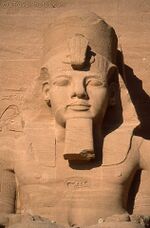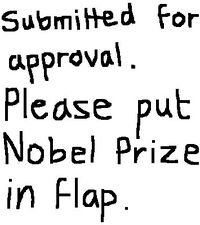Nonexistent People
- To be or not to be, that is the question;
- Whether 'tis nobler in the mind to suffer
- The slings and arrows of outrageous fortune,
- Or to take arms against a sea of troubles,
- And by opposing, end them. To die, to sleep...
Well, it's safe to conclude that that's a choice none of these guys ever got to wrestle with. For here, catalogued in its entirety, is chronicled those that never were, those figments — wraiths, if you will — of one's rampant imagination; those inventions, fantasies and fancies of the psyche. In short, this is the definitive, and complete, list of non-existent people.
The List: Or, Breaking Open The Skull And Feasting On The Succulent Goo Contained Within[edit]
- Tintin
- Mickey Mouse
- Optimus Prime
- Mr. Arm-for-a-leg-and-leg-for-an-arm
- Morpheus (Mythological)
- Morpheus (Black guy, always wears shades and a trenchcoat)
- Hector
- Hector's wife
- Hector's son
- In fact, everyone related to Hector
- SuperTed
- Don Quixote
- Umbertus the Pious-except-on-Fridays
- Batman
- Biko Eisen-Martin
- Patrick's Penis
- Ivan Ilyich
- Dominic Poropat
- Gregor Samsa
- Ralph Wiggum
- Dr. Billy "Shifty-eyes" McGrew
- Pope John Paul III
- Thomas the Tank Engine
- Alexander the-not-so-Great
- Betty Boop
- Willy Wonka
- Sub-Zero
- The Second Gunman
- Raphael (Teenage Mutant Ninja Tutle)
- Mr. Muscle
- Spongebob Squarepants
- Romulus
- Babar the Elephant
- James Joyce
- Ozymandias ("King of Kings")
- Biggus Dickus
- Great Uncle Bulgaria
- The Milkybar Kid
- Jesus
- Tom Brokaw
And if you think this is stupid, then gorge your senses on this.
Methodology: Or, How We Sweet-Talked The Swedish Academy Of Sciences[edit]
First of all, this is serious research. Maybe not Principia level, but do you think Newton started off writing about rainbows and integral calculus straight off? No. First he published his complete list of numbers: an invaluable source of knowledge for his contemporaries and future mathematicians. Did you know that Lagrange himself only formulated his eponymous work on Lagrange points after leafing through Completus Listum Numberulae and discovering 1729? Do you know the possibilities that 127,834,579 open? Why, there are whole fields of research that opened up when Cauchy first read Completus and learned about that number.
And what about Thomas Aquinas? Everyone remembers his proofs about the existence about God, but nobody ever remembers his seminal List of Arguments that Neither Prove nor Disprove the Existence God. Argument 79,812 (Oranges are the only fruit coloured after its name: perhaps the work of a supreme designer?) itself was well celebrated for over a century and spawned countless debates across much of central Europe.
Samuel Johnson. The guy who created the first dictionary. Yeah, him. Ever wanted to know how Microsoft Word knows that you spelled something wrong? Well, it's a, unfortunately, little known fact that it uses a modern version of Johnson's original wrongonary: the world's first complete list of words that don't exist. Yes, that's right, when you type in separate it gets a squiggly red line because Johnson documented for the whole of humanity that it didn't exist. Just think where you'd be if it weren't for Johnson and his disapproves, accommodates, and wkpzds.
And do you think Louis Pasteur developed his work on immunology out of thin air (excuse the pun)? No. First came his research on Things That Do Not Stop Infection: Test 3.1.7: Immersing in water: does not work, Test 8.2.56: Freezing: does not work, Test 12.5.2: Treating with 1,1-dibromo-butane: does not work, Test 22.10.17: Shouting: does not work, all came before his great work, which has probably saved hundreds of millions of lives.
The list is countless: Euclid's Book XXXI: Of All The Different Kinds of Shapes (Now with Dodecahedrons!), Mozart's recently discovered All the Different Combinations of Notes that Produce Horrible Music, Immanuel Kant's systematic study of arguments in All The Different Arguments One Can Make: Most of Which Are Gibberish...
So, you can see the esteemed branch of human knowledge we're entering here. Just imagine, the next time Stan Lee wants to make up a superhero, he can just plod his way through my research and simply pick a name. Simple. Or maybe Intel wants to create a mascot instead of just relying on that stupidly annoying piece of music that always plays? Some sort of anthropomorphic silicon atom perhaps? Then comes the problem of what to name it. Well, fear not you unethical mass of blood-thirsty hounds you can simply look something up in my great exegesis...for a fee, of course: did I forget to mention that?
Methodology (literal): Or, Beating A Dead Horse Until Our Hands Are Sore And Bloody[edit]
The tests used to determine the precise extent to which a person was extant or not were both extensive and thorough. Our crack team of researches employed everything from the fundamental theorem of Algebra to fudging the answers to match the hypotheses in order to break new ground. Some of the aforementioned tests that each subject was subjected to include:
- Analytic Geometry: a 60% score or lower is a sure sign of non-existence.
- Litmus paper: extant people are a sky-bluish colour.
- Blood transfusions: blood from non-existent people is toxic...apparently. On a separate note, we have never met, or indeed ever heard of, any of the people listed under "Guinea-Pig Test Group 1".
- Pupil Contractions: Flash a small light in their eyes, and then swiftly knee them in the balls. A reaction is a sure sign of existence (and then give them an extra dollar).
- Breathing: if they can do it, then that's pretty conclusive that they exist.
- Anomalous Magnetic divergences: I'll take that! There's nothing to see here!
- The Pencil test: invert, rub, and if the subject begins to disappear then I'm pretty sure he/she does not exist.
- The Knife test: thrust, twist, extract, and if the subject is bleeding profusely, then I'm pretty sure he/she does exist (or "did" exist, as the case may be).
- Trial by slander: accuse of homosexual tendencies and wait for a period of 60 days. The lack of any class-action libel case is highly indicative of non-existence.
- Trial by Jehovah's Witnesses: A consistent blood-pressure reading is symptomatic of non-existence. Note: precautions must be taken to ensure existing subjects do not succeed in their desire to bludgeon the Jehova's Witness to death since this will affect our no-claims bonus.
- Trial by Parallel Parking: more than four contacts with the parked cars is a fail.
- Bleep Test: subjects who score less than 7.2 are made to do it again.
- Pleb Test: any subject who picks the Daily Mail from a choice of newspapers must be derided and subject to personal humiliation.
- Ink blot Test: any verbal response is highly suggestive of existence.
A pass in every individual test, and a mark of 70% or higher in the oral exam, is required in order to pass the overall test.
Conclusion: Or, Losing Sight Of The Methodology And Making Up Any Old Plausible Crap[edit]
In conclusion, we feel our study has met the criteria that we sought to satisfy to within a 5% level of significance. We feel that the methods we chose, and the manner in which we conducted those tests, where appropriate and conducted in a manner in which we were able to reduce the random errors to zero (plus or minus four), and reduce the systematic errors to no more than, say, two...at MOST. Furthermore, all our ideas are testable and repeatable and so do certainly qualify as being a part of the broader concept of the post-Renaissance ideas on physical enquiry into the physical world that one may be able to conduct, experimentally speaking, in such a post-Renaissance world in which one is able to conduct physical enquiry for the purposes of one's experimental testing procedures and analyses of the physical world that modern contemporaries would certain call "science", but which, more generally, is a general approach that follows — nay, adheres to — the idioms and philosophies of the famous, and indeed venerable, scientific method. Further furthermore, we believe that our work is significant since it allows one to determine a facet of nature that was, until this point, unknown; and this is useful because it opens up possible work in other areas of study.




